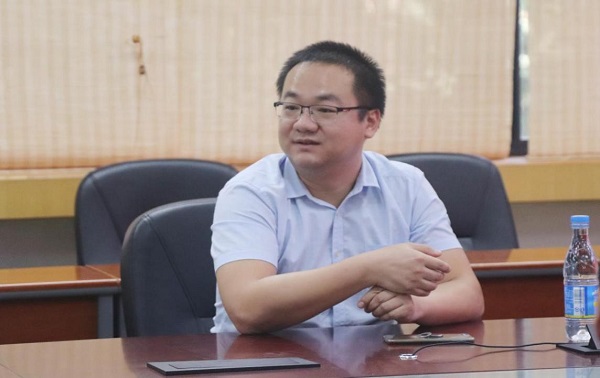Study on Modernization of Traditional Economic Thoughts in Modern China (1840-1949): Taking the Economics on People’s Livelihood for Example
On the afternoon of November 22, the 7th Academic Salon for Ph.D. Students in Theoretical Economics in 2019 (the 49th in history) was staged by the China Center for Special Economic Zone Research (CCSEZR), Shenzhen University (SZU) at the Building Huidian (SZU Northern Library). The salon was presided over by Dr. Huang Yiheng, a CCSEZR teacher, and attended by the doctoral students from CCSEZR. The guest speaker of the salon was Dr. Xiong Jinwu, who received his PhD from the Shanghai University of Finance and Economics and was a postdoctoral fellow at Tsinghua University, with research interests in the history of economic thoughts and the history of enterprises. Dr. Xiong is an associate professor and assistant to the president of the Business School, China University of Political Science and Law (CUPL), the director of the Enterprise Research Center, the deputy secretary of the Society of Chinese Commercial History and the executive director of the China Society for the History of Economic Thought.
Prof. Xiong delivered a lecture titled “Study on Modernization of Traditional Economic Thoughts in Modern China (1840-1949): Taking the Economics on People’s Livelihood for Example.” From a new historical perspective, Prof. Xiong reckoned that charting the changes in the economic thoughts of Modern China was not only a mission for this discipline to inherit and develop traditional Chinese economic thoughts, but also carried certain historical implications for building socialist economic theories with Chinese characteristics. He indicated that we need to objectively understand the status of traditional Chinese economic thoughts from the following two lenses: first, Chinese economic thoughts have taken shape and developed into a system rich of regional uniqueness over a long period of history; second, it is necessary to objectively learn about the exchange and integration of economic ideas from different civilizations across the world. He brought forth that since modern times, scholars like Liang Qichao had devoted a lot of efforts in delving into traditional Chinese economic thoughts under the influence of western economic thoughts. There are two paths to modernization of “late-developing” economic thought paradigm: first, to study the history of spread - the transmission and translation of western economics worldwide; second, to adopt the modernization of the traditional economic thoughts, that is, the modernized transformation of the existing traditional economic thoughts in the “late-developing” region. China chose the second path - the modernization of traditional Chinese economic thoughts, to inherit and innovate Chinese traditional economic thoughts, obtain the scientific paradigm of modern economics, and form a school of economics with regional characteristics. On such a basis, it is possible to establish a research framework and judgment standards. Finally, Prof. Xiong indicated that modernization of traditional economic thoughts already existed in modern China and was progressive. First, the modernization of traditional economic thoughts exists. Chinese economic thoughts not only have a dissemination path like western ones, but also successfully achieve modernization. Second, the modernization of traditional economic thoughts is progressive. To advance Chinese economics, we must critically capitalize on the achievements in foreign economics, but also inherit and innovate traditional Chinese economic thoughts. Developing a theoretical system of modern economics with Chinese characteristics addresses China’s economic challenges and enriches modern economics as well. Third, economics on people’s livelihood is a traditional Chinese economic thought with a scientific paradigm of modern economics, the fruition of the modernization of the traditional Chinese economic thought paradigm, and a relatively progressive school of economics.
After the lecture, Dr. Xiong exchanged ideas with CCSEZR’s doctoral students on the search and use of historical archives, the social responsibilities of modern Chinese enterprises and innovations. This salon was profound in contents and delivered in a lucid approach, helping students build better understanding of the history of economic thoughts.
(Correspondent: Chen Hongbo)

Associate Prof. Xiong delivers a brilliant lecture

Dr. Huang presides over the salon

A group photo of the attendees at the salon


